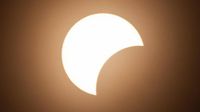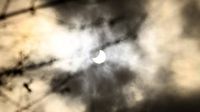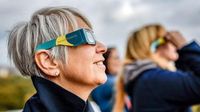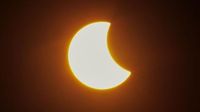On Saturday, March 29, 2025, a partial solar eclipse will grace the skies over Germany, captivating skywatchers across the nation. This astronomical event comes nearly 42 months after the last solar eclipse visible in the German-speaking world, which occurred on October 25, 2022. As the moon passes between the Earth and the sun, it will obscure varying percentages of sunlight depending on the observer's location.
The eclipse will begin in different cities at staggered times. In Aachen, the obscuration will commence at 11:17 AM, while in Berlin, it will start at 11:32 AM. The maximum coverage of the sun will occur between 12:09 PM and 12:19 PM, depending on the location, and the entire phenomenon will conclude shortly after 1 PM.
In Bremen, the eclipse will begin at 11:24 AM, with the moon covering approximately 20 percent of the sun at around 12:15 PM. The event will end at 1:07 PM. According to Dieter Vornholz, the former director of the Olbers Planetarium, viewers in Bremen should ensure they have proper solar viewing glasses, as looking directly at the sun can lead to severe eye damage.
For those in northern Germany, the eclipse will be particularly striking. In Kiel, observers can expect up to 22 percent of the sun to be obscured. Meanwhile, cities like Munich will see about 10 percent coverage. The eclipse will be less pronounced in southern regions, where only about 10 percent of the sun will be covered.
As the eclipse progresses, it will be visible in various parts of Europe, including the far northwest of Africa, Greenland, and Newfoundland. The largest obscuration will be seen in Greenland, where up to 87 percent of the sun will be covered. In Newfoundland, observers will see about 83 percent coverage, and in the Labrador region of eastern Canada, the maximum darkening will reach 93 percent.
Skywatchers are advised to take precautions while observing the eclipse. Tim Florian Horn, director of the Berlin Planetarium, cautioned, "Never look directly at the sun!" He emphasized the importance of using special solar eclipse glasses with the CE mark, as ordinary sunglasses do not provide adequate protection. For those without eclipse glasses, many planetariums and observatories offer viewing events with safe equipment.
Weather conditions could impact visibility, as experts from the German Weather Service predict cloud cover across much of Germany. However, those in the northern and northwestern parts of the country may have the best chance for clear skies. Observers should seek locations with unobstructed views of the sky to fully enjoy the spectacle.
The partial solar eclipse will also serve as a reminder of the next opportunity for such an event in Germany. The next partial solar eclipse will occur on August 12, 2026, when over 80 percent of the sun will be obscured in many locations. This eclipse will be particularly notable, as it will be total in the Balearic Islands and parts of northern Spain.
As excitement builds for the upcoming eclipse, many are eager to witness this celestial event. With proper precautions and a little luck, skywatchers across Germany will have the chance to see a beautiful display of nature's wonders. However, for those who miss this opportunity, the next total solar eclipse visible from Germany won't occur until 2081, making this event a must-see.
In summary, the partial solar eclipse on March 29, 2025, promises to be a remarkable experience for many across Germany. With varying degrees of obscuration depending on location and the necessity of proper viewing equipment, the event encourages both excitement and caution among observers. As the moon dances across the sun, it will create a moment of awe that connects viewers to the cosmos, reminding us of the beauty and mystery of our universe.





